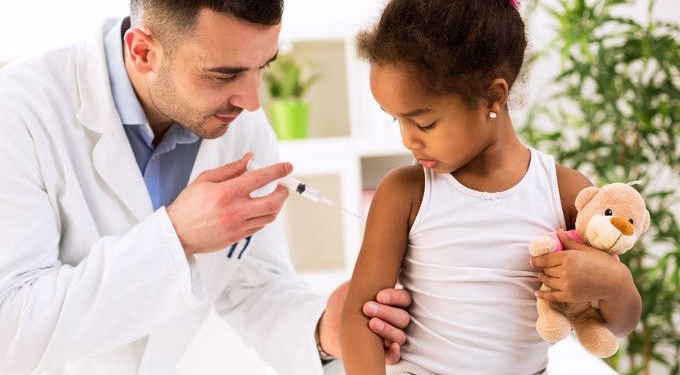
Children under age 5 will likely require a three-dose regimen of the COVID vaccine, Dr. Anthony Fauci said during an interview Thursday with Blue Star Families, a nonprofit group that supports military families.
Fauci said he hopes the U.S. Food and Drug Administration (FDA) will authorize the Pfizer-BioNTech for the younger age group next month, stating:
“My hope is that it’s going to be within the next month or so and not much later than that, but I can’t guarantee that.
“I can’t outguess the FDA. I’m going to have to leave that to them.”
He later clarified in a statement to CNBC that he has no involvement with the FDA’s approval process, saying:
“I did not at all mean to imply that the authorization would come within a month. I meant that we do not know … I am not involved in that decision.”
Two separate clinical trials of Pfizer-BioNTech’s COVID vaccine are in progress: one involving children between the ages of 6 months to 2 years old, the other involving children between ages 2 and 4.
“[T]wo shots did not induce an adequate immune response in children 2 to 4 years old in Pfizer’s clinical trials,” CNBC reported.
During Thursday’s interview Fauci said, “[d]ose and regimen for children 6 months to 24 months worked well, but it turned out the other group from 24 months to 4 years did not yet reach the level of non-inferiority, so the studies are continued.”
Pfizer said in a Dec. 17, 2021 press release it intends to submit data to the FDA sometime during the first half of this year if the three-dose study is successful, adding the company did not identify any safety concerns with the 3-microgram doses are administered to children participating in both trials.
By comparison, adults receive two 30-microgram doses as part of the primary two-shot series.
Earlier this month, on Jan. 3, the FDA extended Pfizer’s Emergency Use Authorization (EUA) for a booster dose of its COVID vaccine for 12 – to 15-year-olds.
The World Health Organization last week said there is no evidence healthy children and young adults need COVID booster shots.
The Pfizer-BioNTech vaccine is also the only COVID vaccine currently authorized for administration to children aged 5 to 11.
Dr. Rochelle Walensky, director of the Centers for Disease Control and Prevention (CDC), stated earlier in January there is no evidence that the Omicron variant causes more severe illness in children, when compared to earlier strains of the virus, raising questions about the need to vaccinate young children.
As previously reported by The Defender, the push to authorize COVID vaccines for younger children could be tied to the fact that vaccine makers benefit from legal protections for childhood vaccines.
Under the National Childhood Vaccine Injury Act of 1986, when CDC’s Advisory Committee for Immunization Practices places a vaccine on the mandatory childhood vaccine schedule, vaccine makers are shielded from liability for injury claims.
However, as long as its COVID vaccine for children remains under EUA, Pfizer will also benefit from liability protections provided under the Public Readiness and Emergency Preparedness Act — so either way, the vaccine maker won’t be held accountable if its product harms young children.
While the U.S. pushes for COVID vaccines for children as young as 6 months, Sweden’s public health authorities this week announced they will not recommend the vaccines for children between the ages of 5 and 11.
Britta Bjorkholm, an official with Sweden’s Health Agency, stated “[w]ith the knowledge we have today, with a low risk for a serious disease for kids, we don’t see any clear benefit with vaccinating them.”
Norway opted to make COVID vaccines optional for children aged 5-11.
The Norwegian Institute of Public Health stated the risk of severe illness in children that are brought on by COVID is small, and that as a result, the need for children to receive a COVID vaccine is limited.
Norway’s announcement, in turn, prompted the Danish Pediatric Society to request that Denmark’s Health Authority revisit its decision to recommend COVID-19 vaccination for children in Denmark.

















